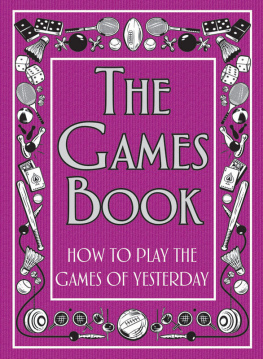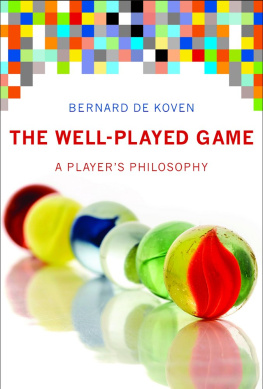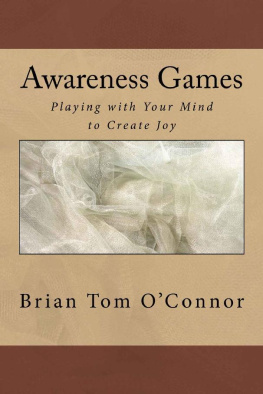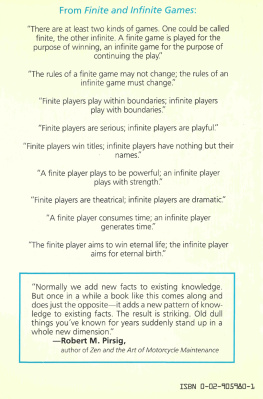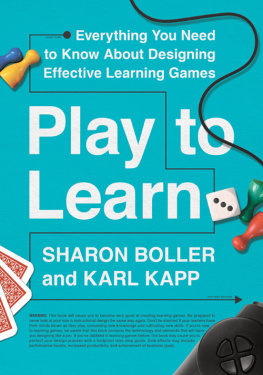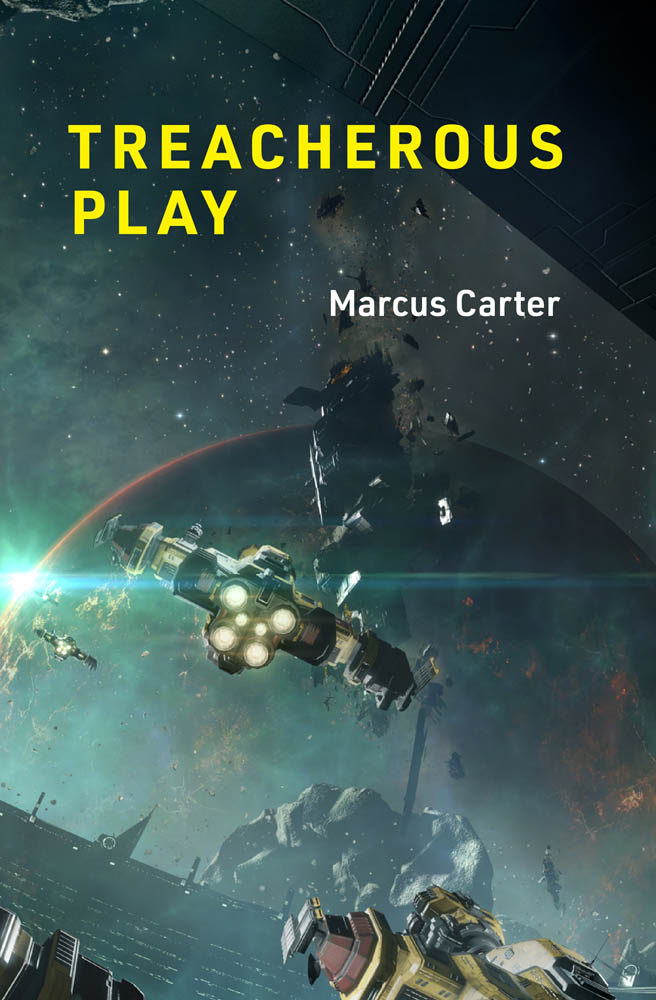
Treacherous Play
Playful Thinking
Jesper Juul, Geoffrey Long, William Uricchio, and Mia Consalvo, editors
The Art of Failure: An Essay on the Pain of Playing Video Games, Jesper Juul, 2013
Uncertainty in Games, Greg Costikyan, 2013
Play Matters, Miguel Sicart, 2014
Works of Game: On the Aesthetics of Games and Art, John Sharp, 2015
How Games Move Us: Emotion by Design, Katherine Isbister, 2016
Playing Smart: On Games, Intelligence, and Artificial Intelligence, Julian Togelius, 2018
Fun, Taste, & Games: An Aesthetics of the Idle, Unproductive, and Otherwise Playful, John Sharp and David Thomas, 2019
Real Games: Whats Legitimate and Whats Not in Contemporary Video Games, Mia Consalvo and Christopher A. Paul, 2019
Achievement Relocked: Loss Aversion and Game Design, Geoffrey Engelstein, 2020
Play Like a Feminist, Shira Chess, 2020
Ambient Play, Larissa Hjorth and Ingrid Richardson, 2020
Making Games: The Politics and Poetics of Game Creation Tools, Stefan Werning, 2021
Treacherous Play, Marcus Carter, 2022
Treacherous Play
Marcus Carter
The MIT Press
Cambridge, Massachusetts
London, England
2022 Massachusetts Institute of Technology
All rights reserved. No part of this book may be reproduced in any form by any electronic or mechanical means (including photocopying, recording, or information storage and retrieval) without permission in writing from the publisher.
The MIT Press would like to thank the anonymous peer reviewers who provided comments on drafts of this book. The generous work of academic experts is essential for establishing the authority and quality of our publications. We acknowledge with gratitude the contributions of these otherwise uncredited readers.
Library of Congress Cataloging-in-Publication Data
Names: Carter, Marcus, author.
Title: Treacherous play / Marcus Carter.
Description: Cambridge, Massachusetts : The MIT Press, 2022. | Series: Playful thinking | Includes bibliographical references and index.
Identifiers: LCCN 2021000494 | ISBN 9780262046312 (hardcover)
Subjects: LCSH: Games--Psychological aspects. | Deception.
Classification: LCC GV1201.37 .C37 2022 | DDC 790.1--dc23
LC record available at https://lccn.loc.gov/2021000494
d_r0
Contents
Many people (we series editors included) find video games exhilarating, but it can be just as interesting to ponder why that is so. What do video games do? What can they be used for? How do they work? How do they relate to the rest of the world? Why is play both so important and so powerful?
Playful Thinking is a series of short, readable, and argumentative books that share some playfulness and excitement with the games that they are about. Each book in the series is small enough to fit in a backpack or coat pocket, and combines depth with readability for any reader interested in playing more thoughtfully or thinking more playfully. This includes, but is by no means limited to, academics, game makers, and curious players.
So, we are casting our net wide. Each book in our series provides a blend of new insights and interesting arguments with overviews of knowledge from game studies and other areas. You will see this reflected not just in the range of titles in our series, but in the range of authors creating them. Our basic assumption is simple: video games are such a flourishing medium that any new perspective on them is likely to show us something unseen or forgotten, including those from such unconventional voices as artists, philosophers, or specialists in other industries or fields of study. These books are bridge builders, cross-pollinating both areas with new knowledge and new ways of thinking.
At its heart, this is what Playful Thinking is all about: new ways of thinking about games and new ways of using games to think about the rest of the world.
Jesper Juul
Geoffrey Long
William Uricchio
Mia Consalvo
Games that are deliberately designed to enable or invite betrayal are extremely rare.
If you steal from your guild in World of Warcraft, the games moderators will return the stolen goods and suspend your account. Most first-person shooter (FPS) games code away the killing of teammates by disabling friendly fire and structuring the competition in such a way that betraying your team would offer no in-game reward. In most tabletop games, where these types of coded rules arent possible, trust is implicit. The rules of Monopoly dont need to say that you must not lie or steal from other players, because deception and betrayal are just assumed to be an illegitimate way of playing the game. Playing treacherously is typically treated as an off-limits type of play that will ruin the experience of other players and is actively designed against in most multiplayer games.
Indeed, the games scholar Staffan Bjrk categorizes some games with deception and betrayal as examples of feel-bad games for the unusually negative emotions they provoke in players. I have included the rules for So Long Sucker in the appendix at the end of the book, if you want to test this reputation for yourself.
But why? Of all the things that seem totally appropriate to do in games, why is treacherous play so polarizing? Why is the emotional experience so exceptional?
In this book, I explore an underexplored type of play that sits on the border of what is commonly understood to be acceptable or appropriate to do in a game. It is a type of play that is not for everyone. Through case studies of games that explicitly permit betrayal, I illuminate and complicate some assumptions that scholars, designers, and players often make about the limits of competition in multiplayer games; the appeal of negative experiences; how social interactions can be a part of play; and how we draw the lines between who you are in a game, and who you are in real life. To borrow an argument from Jaakko Stenros, transgressive play is still play, and if we only look at half the picture, we cannot grasp the whole phenomenon and its nuances.
Here I focus specifically on the few examples of where treacherous play is successful. By this, I mean where it occurs within the rules of the game, and where the presence of treachery has undeniably contributed to a games appeal and success. This includes play like yelling Friendly! Dont shoot! when you encounter another player in DayZ, but burying an ax in their head when they turn around; promising another player in Survivor that you will take them to the final three, but then writing their name down at the next tribal council; and being a productive member of an EVE Online corporation while selling military secrets to its enemies. Some of the cases in this book are provocative, but they help uncover aspects of play that often get hidden, ignored, or designed away.
By looking at this other half of the picture, we can start to imagine more about what the possibilities are for this emerging medium.
Treacherous Assumptions
There are three assumptions I often see players and scholars making about treacherous play: gut reactions to the idea of betraying for fun. The purpose of this book is not to dispel these assumptions but to use them to develop a deeper understanding about treacherous play and uncover what it can contribute to how we think about games and play more broadly.
Next page

